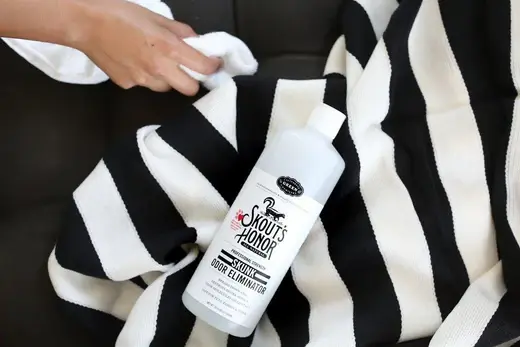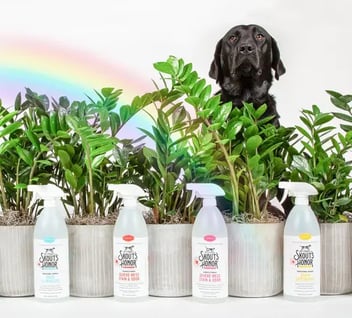What the Skunk?! Handling Skunk Odors Safely and Effectively

Skunk season is here, and the chances of your pet getting sprayed are higher than ever. Skunk odor remover products like Skout’s Honor’s award-winning skunk odor eliminator offer a fast, effective solution when your pet or home is exposed to that infamous smell. In this post, we'll cover what to do if your pet is sprayed, how to handle skunk odors in your home, and the best natural skunk odor remover options available.
An Award-Winning Skunk Odor Remover Formula!
Mid-February is the prime mating season for striped, hog-nosed, and hooded skunks, which is why their signature smell is so common around this time of year. Used as a defense mechanism, skunks spray each other when competing for a mate, or when unreceptive to courting attempts. Oftentimes, curious dogs or cats find themselves in the wrong place at the wrong time, and end up being the recipient of a skunk’s spray — and that’s when things can get crazy. Cleaning up a skunked animal is one thing, but once that skunked animal runs into your house and rolls around on the carpets, flooring and furniture to rid themselves of the odor, you’ve got a much bigger problem to deal with.
The age-old method of bathing your animal in tomato juice to soak out the odor may still work for some, but for most it’s not a realistic solution. Luckily, products like Skout’s Honor’s NEW Skunk Odor Eliminator can help knock out odors quickly and effectively to provide relief for both you and your pet. This special, award-winning formula breaks down and destroys skunk spray and odor molecules on contact and is safe to use on both skunked animals & surfaces!
Skunk Facts:
- Skunks are cat-sized or smaller; all of the five species found throughout North America can be identified by their distinctive black and white coloration of either stripes or spots.
- Skunks are extremely nearsighted, yet have a very fine-tuned sense of smell.
- Skunks are solitary, except when raising young or sharing a den for warmth.
- Striped skunks, hog-nosed, and hooded skunks breed in February and March and the babies are born in May and June. Spotted skunks breed either later in the spring, in early summer, or in the fall — as is the case with western spotted skunks.
- Skunks den in natural cavities like woodchuck burrows, hollow logs, and brush piles, as well as crevices in stone walls and under buildings.
- A den is used only for brief periods because skunks are nomadic.
- Once classified as members of the family that includes weasels, martens, and badgers, skunks are now placed in a family of their own.
- Skunks can be active all year but will remain in dens during cold spells.
- Skunks often tumble into window wells and are not able to climb out due to their nearsightedness and poor climbing ability. If a skunk is stuck in a window well, it is very easy to help them out.
- Skunks follow their noses, so if a garage door is open, a skunk will likely amble in. If the skunk enters the garage, The HSUS recommends leaving a garage door open at night and sprinkling flour along the bottom of it so you can see exiting tracks.
*Reposted content from Humane Society




